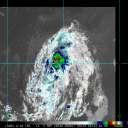Show Selection:
|
#904305 (Received by flhurricane at: 4:37 PM 23.Sep.2017)
TCDAT4
Tropical Storm Lee Discussion Number 22
NWS National Hurricane Center Miami FL AL142017
500 PM AST Sat Sep 23 2017
Compact Lee continues to produce a small cluster of central deep
convection, along with several small curved bands in all quadrants.
Ship LAOX5 traversed through the center of Lee around 1400Z, and at
1500Z reported a north wind of 30 kt about 20 nmi west of the
center. Based on that ship observation, along with satellite
intensity estimates of T2.5/35 kt from TAFB and UW-CIMSS ADT, the
initial intensity remains at 40 kt for this advisory.
The initial motion is a slow drift toward the north-northwest or
335/03 kt. The global and regional models have come into much
better agreement on this cycle and now show a much tighter
anticyclonic loop occurring during the forecast period, similar to
the current and previous runs of the ECMWF model. As result, the
official NHC forecast is west of the previous advisory track, and
lies close to a blend of the TCVA, TVCX, and HCCA consensus models.
There is no significant change to the previous forecast or
reasoning. Due to the tighter loop that Lee is expected to make
within the col region between an upper-level low to the south and a
mid-latitude trough to the north, the deep-layer vertical wind shear
is now forecast to remain less than 10 kt throughout the forecast
period. Since the small cyclone will remain over SSTs near 27.5 C
within a region of below-average upper-level temperatures, strong
instability should persist for the next 4 days. The only inhibiting
factor during that time will continue to be occasional intrusions of
very dry mid-level air that will temporarily disrupt the inner-core
convection. By 120 hours, gradual weakening is expected to begin
due to increasing westerly shear. The new NHC intensity forecast is
unchanged from the previous advisory, and remains close to a blend
of the IVCN and HCCA intensity consensus models.
FORECAST POSITIONS AND MAX WINDS
INIT 23/2100Z 32.1N 49.8W 40 KT 45 MPH
12H 24/0600Z 32.3N 49.3W 45 KT 50 MPH
24H 24/1800Z 32.2N 48.7W 50 KT 60 MPH
36H 25/0600Z 31.8N 48.4W 55 KT 65 MPH
48H 25/1800Z 31.1N 48.2W 60 KT 70 MPH
72H 26/1800Z 30.5N 49.0W 70 KT 80 MPH
96H 27/1800Z 31.0N 50.5W 70 KT 80 MPH
120H 28/1800Z 32.4N 51.7W 65 KT 75 MPH
$$
Forecaster Stewart |



